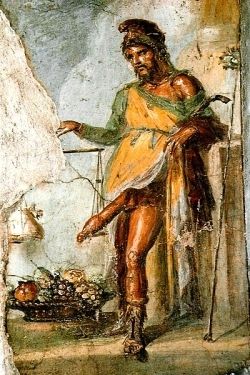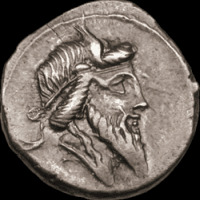Chapters
Priapus was the Roman god of fertility, the guarantor of fertility. He was the son of Dionysus or Hermes and Aphrodite. He looked after gardens, trees growing in them and vineyards. The cult of Priapus was taken over by the Romans and adapted to their mythology. In Rome, Priapus was initially the keeper of orchards and vineyards, and later also of fertility and harvest. Priapus’s sacrificial animal was a donkey.
In the gardens, statues or herms depicting Priapus with an exposed member in an erect state were often placed, at which he was offered sacrifices from the first crops.
Priapea
Pieces of frivolous content were written in honour of Priapus (the so-called Priapusea). Poems dedicated to Priapus became popular in Rome at the end of the republic’s existence. Some of the first Priapuseas were the work of Catullus.
The greatest dissemination of the Priapuseas in Roman literature took place during the reign of Augustus. At that time, poems devoted to Priapus were written by, among others, Horace and Tibullus. During the reign of Octavian of Augustus, the circle of poets gathered around Patron, the surviving anonymous collection of 85 Priapuses. These works, stylized as folk poetry, are a testimony to the great literary skill of the author (or authors), full of references, among others to Homer or Eratosthenes. In later years, Priapusea wrote, inter alia, Martial.
In the 2nd century CE, when Priapus began to be worshipped as the creator of nature, the works dedicated to him took on a more serious character. From this period comes, among others, the anonymous Hymn to Priapus, engraved on the herme discovered at Tivoli.
Mutunus Tutunus
A denarius issued by Quintus Titus, allegedly representing Mutunus Tutunus.Mutunus Tutunus or Mutinus Titinus was a god who was often identified with Priapus. On the Velian hill in Rome, there was supposed to be a sanctuary with a statue of Mutunus Tutunus, imagined as a phallus. According to reports, women were to go to this sanctuary to crown the statue of the deity with wreaths.
There are also messages according to which the images of the deity were supposed to be in the bedrooms. On their wedding day, brides were to sit on the image of the deity to offer him their virginity.
This deity is poorly certified in sources, only Pompey Festus mentions him from Roman writers. Later accounts come from early Christian writers – Tertullian, Augustine, Lactantius and Arnobius.








